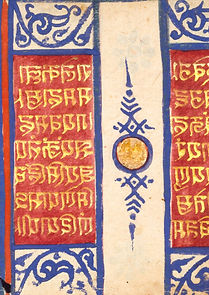
An Introduction to the History & Philosophy of Yoga - a 12-week online course in practical philosophy

Ready to take the dive?
Join the waitlist for my next online course into the History & Philosophy of Yoga, starting in Autumn/Winter 2025.
In my work, yoga philosophy is not about abstract ideas far removed from daily life. Instead, yoga philosophy is a practice of enquiry: asking questions relevant to our lives and practices to deepen our meaningful engagement with and through the world.
Through 6 live lectures and 6 live calls, this 12-week course into the History and Philosophy of Yoga is both a journey of learning about yoga and a deepening of what yoga means for us.
Designed for yoga teachers and serious practitioners who want to move beyond surface-level learning into a space of critical enquiry, personal reflection, and embodied understanding, through the course we explore yoga’s rich philosophical and historical roots, not as distant concepts, but as tools for living and teaching with more depth, clarity, and authenticity.
Round 2 starts in Autumn/ Winter 2025.
Who is this course for?
This course is designed for both yoga teachers and serious practitioners who want to move beyond surface-level learning into a space of critical enquiry, personal reflection, and embodied understanding.
Together, we’ll explore the rich philosophical and historical roots of yoga—not as abstract or distant ideas, but as living tools for deepening your connection to the yogic tradition, your personal practice, and your values today.
Maybe you already sense that yoga is grounded in “ancient wisdom” and a long-standing tradition—but you haven’t had the opportunity to explore the details or question the narratives you've been told. If you’re feeling disillusioned by vague spirituality or tired of being handed simplified versions of yoga’s “truth,” this course offers an evidence-based, reflective, and community-centred approach to learning.
With space for discussion, shared enquiry, and personal integration, this is a journey toward a more grounded, nuanced, and empowered relationship with yoga—rooted in both scholarship and lived experience. I can't wait to welcome you into this space!






About your teacher and facilitator | Floss Harry
Hi, I’m Floss—a yoga teacher, facilitator, and researcher with a background in philosophy, theology, and embodied practice. I have studied extensively with Oxford Centre for Hindu Studies, taking courses in Yoga Philosophy, Tantra, and Yogic Asceticism. I also hold an Advanced Diploma and Masters in Philosophy of Religion and Sanskrit from the University of Cambridge, where I explored the relationship between philosophy and lived experience.
Through my teaching and facilitation, I help yoga practitioners and teachers connect with the deeper roots of yoga history and philosophy, as well as exploring the value of other religious, spiritual and contemplative traditions. For me, these philosophical ideas are not just as something to study, but as something to reflect on and enquire into, where contemplative philosophy goes hand in hand with embodied practice; they are two sides of the same coin., that help us live better, fuller and more meaningful lives.
Lecture outlines:
Each lecture explores a different theme or period in the history and philosophy of yoga. Together, they build a picture of yoga as a diverse, evolving, and often contradictory tradition—inviting reflection, curiosity, and critical engagement which we will further explore through our live Zoom sessions.
Lecture 1: What Is (Yoga) Philosophy?
We begin by asking what we mean by 'philosophy'—in yoga and in life. You'll explore different ways of thinking about knowledge, liberation, and practice.
Lecture 2: Ancient Yoga – The Vedas, Upaniṣads & Early Concepts
A deep dive into some of the earliest Indian texts that shaped yogic worldviews: ritual, renunciation, liberation (moksha), and the Self (ātman).
Lecture 3: Classical Yoga – Patañjali and the Eight Limbs
Unpacking the Yoga Sūtras, dualism, the eight limbs (aṣṭāṅga yoga), and how this shaped later ideas of practice and purity.
Lecture 4: Beyond Patañjali - Evolving Visions of Yoga, Dharma, and Liberation
Explore how Indian philosophy reimagined yoga after Patañjali—through devotion, action, and non-duality. This lecture dives into the Bhagavad Gītā, Advaita Vedānta, and the Laws of Manu to trace evolving answers to timeless questions about self, duty, and liberation.
Lecture 5: Medieval Developments: Tantra, Hatha and the Body as Sacred
Explore non-dual Śaiva Tantra, embodied liberation, subtle body maps (like kuṇḍalinī and chakras), and their influence on modern yoga.
Lecture 6: Colonialism, Orientalism & Yoga Today
How yoga was reshaped under colonial rule—through nationalism, Western interest, and the invention of modern postural yoga.
We also explore contemporary currents: the rise of post-lineage yoga, decolonial thought, trauma-informed practice, and the - should what we practice today even be called yoga?

Floss creates much-needed spaces for yoga teachers and practitioners to share, enquire and discuss from a place of curiosity. She is wonderful at creating an inviting, comfortable, atmosphere in the way that she gently facilitates her sessions."
— Elene, London

"Her teachings invite you to not just think about philosophy, but to feel it, live it, and integrate it into your whole being. I left her sessions feeling both inspired and more connected to myself and my purpose as a teacher.”
— Anna, Cambridge
"Studying the philosophy and history of yoga is essential. Not just to know about yoga’s development, though this is important. But to deepen our understanding and exploration of yoga, philosophy and spirituality personally in our own lives; reflecting on the past, and enquiring in the present. This course provides a well-needed space and community for that enquiry."
Floss Harry
